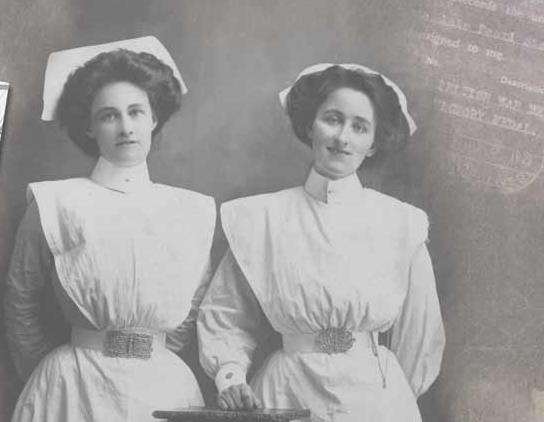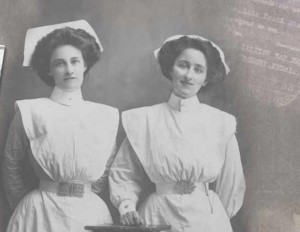Sisters Lydia (known as Kath) and Esther (known as Wynne) King, daughters of Orange Municipal Council Alderman Henry King and his wife Lydia, were among the first nurses to volunteer for war service. Kath had trained at Prince Alfred Hospital in Sydney and was aged 28 when she enlisted towards the end of 1914. Sailing from Sydney on the Kyarra, she arrived in Egypt in mid-January 1915 and commenced work in the No 2 General Hospital in Cairo. As the date for the planned invasion of Gallipoli neared, Kath was sent aboard the hospital ship Sicilia to prepare for mass casualties and on 25 April, was inundated with severely wounded men. That night she wrote in her diary:
At 1.30am received forty-six wounded, mostly badly. Dreadful wounds. And nearly all were soaking wet, their clothes sticking into their wounds. It was just dreadful. We got them undressed, their wounds attended to, made them warm and gave them hot drinks, then all they wanted was sleep.
The constant work and high number of fatalities took their toll; the physical and mental exhaustion were reflected in Kath’s diary:
I have such a nice boy, too sick to be moved. We have given him subcutaneous saline and everything. Finished loading 6pm and stayed with my patient and instead of dinner I relieved my feelings in my room. My patient died at 10.10pm. My nineteenth death in a fortnight, and such lovely boys. Am just heartily sick of the whole of the war.
In July 1915 Kath was joined in Cairo by her younger sister Wynne, who had trained at Orange District Hospital under Matron Dooly. Wynne stayed in Egypt for some time, nursing wounded soldiers from the Gallipoli campaign in the hospital at Heliopolis. She described a typical day in a letter to her parents in Orange:
We were fearfully busy last night, as 600 patients were brought in by train from Alexandria. I had to pity my special pal. She went down to look at the casualty list on arrival and found her brother’s name there, he having died a fortnight before from wounds received … Most of our work consists of dressing bullet and shrapnel wounds, doing it from daylight till dawn.
In Egypt Kath had been working with a fellow nurse from Prince Alfred Hospital, Ursula Carter. She became friendly with Ursula’s brother, Captain Gordon Carter, who was serving in the eastern Mediterranean. Captain Carter suffered shell-shock in May, followed by a severe bout of exhaustion and was sent to No 1 General Hospital in Cairo for ten weeks’ sick leave.
In January 1916 Kath and Wynne sailed on the Ulysses, caring for patients returning to Australia. On their return to Orange the local branch of the Red Cross Society hosted a reception at the Town Hall, which was extravagantly decorated with flags, bunting and pot plants for the occasion. Speeches were made by the Mayor, Alderman Edwin McNeilly, Mrs Hodges, of the Red Cross Society and Mr J M Paul, a probationer at Orange District Hospital.
The nurses spent a hectic 10 days in Orange before travelling to Melbourne and embarking on the Euripides for the voyage back to Egypt. In Cairo Kath resumed her friendship with Gordon Carter and in June they became engaged. A couple of weeks later Carter was sent to France and Kath and Wynne to Netley Hospital near Southampton in England where they tended seriously wounded soldiers. Kath and Gordon were married on 31 January 1917 in the Parish Church at Southall, with Wynne as bridesmaid. Kath’s marriage meant the end of her Army nursing career because married women were forced to resign. However, as her husband was still on active service in France, she remained in England, finding work at Harefield Hospital, where she cared for sick and wounded Australian soldiers. She nursed there for a few months, leaving when expecting their first child. Wynne continued nursing in England and France until June 1918, when she returned to Australia. In 1919 she travelled to India, where she nursed in various British hospitals.
Kath and Wynne’s names appear on the Holy Trinity Church Orange Honour Roll.
* Edwards, Elisabeth 2011, In sickness and in health: how medicine helped shape Orange’s history, Orange City Council, Orange, NSW



Fantastic reading,it is interesting reading these stories of the nurses and how hard they worked.